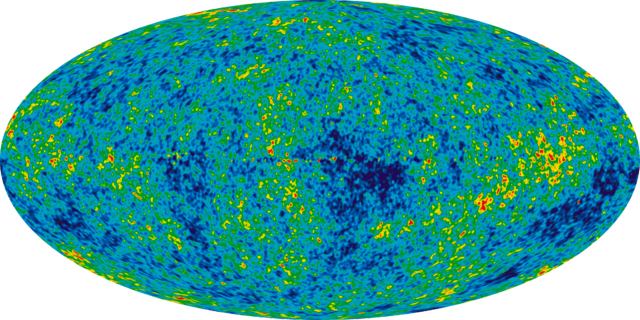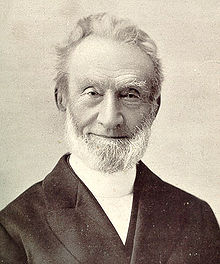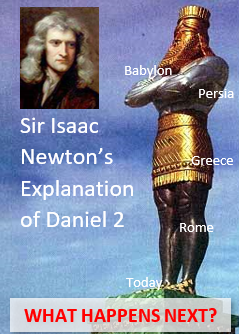Evidences for God
 Black Swallowtail - Papilio polyxenes
Black Swallowtail - Papilio polyxenes1. The existence of life
The simplest living things exhibit an extraordinary amount of complexity. The highly ordered system by which DNA, with the assistance of proteins, is replicated and is transcribed into mRNA which is then translated into proteins including the very same proteins necessary for DNA replication and transcription; the elaborate motor-like ATP synthase mechanism made up of about two-dozen protein subunits (about a half dozen different kinds of subunits) that is an absolutely essential component to all known organisms; and the many other elegant biochemical systems and structures that make up even the simplest bacteria and other prokaryotic cells: all these challenge the theory that living things spontaneously arose from non-living material with no input of intelligence. The first organisms (or proto-organisms) capable of reproduction would have had to emerge without the aid of natural selection since natural selection can only operate on reproducing entities. Attempts to suggest a cogent manner whereby the first living things may have been spontaneously generated have been unconvincing at best.
In virtually any other field of inquiry—such as when examining an archaeological artifact—organized complexity is seen as compelling evidence of the input of intelligence. It is true that Darwin suggested a method—natural selection—whereby it is commonly thought that nature can mimic intelligence, but natural selection requires the preexistence of living, self-replicating entities. In Darwin's day, it was easy to suppose that the simplest living things, bacteria, could arise spontaneously, and so the question of abiogenesis wasn't seen as a major difficulty. Most scientists of his day assumed that bacteria, and even eukaryotic cells, were quite simple. Today, we know that this assumption is far from the truth. Yet evolutionary assumptions and naturalistic thinking have so permeated modern thought and become accepted as axiomatic and inseparable to scientific endeavor, that the difficulty of explaining the origin of the first life apart from the input of intelligence is generally glossed over as a minor trifle in the confidence that an answer to this enigma must certainly be forthcoming.
2. Inherent limitations to natural selection
Natural selection only selects for present advantages and makes no provision for future advantages. There are countless elegant systems in living things that continue to evade a sensible step-by-step explanation in which each step has a selective advantage over the preceding step. The bacterial flagella is the flagship example, and probably for good reason. It is intellectually and visually compelling and rebuttals have been less than convincing when carefully examined. For the bacterial flagella to function, a number of components need to be put together properly. If just a few components are missing, or if they are even misassembled, it will not work at all and there is no selective advantage to retain the components that are there. The argument that the flagellum evolved step-by-step through the co-option of simpler structures that had different functions has major difficulties, but the plausibility that this could happen is what needs to be demonstrated to discount the bacterial flagellum as evidence for intelligent design.
3. The existence of the physical universe
There is perhaps little that can enrapture the human mind like looking out into the incomprehensible depth of outer space, or even just fondling a small stone, and marveling at the sheer fact of existence.
Some consider it easier to suppose that the physical universe somehow just self-exists than it is to suppose that a Creator God made it. After all, a Creator God, it is argued, would have to be much more complicated than the universe He created, and so we would then be stuck with the greater problem of how it is possible for a God who is orders of magnitude more complicated than the physical universe to self-exist. Certainly, the Creator of the universe must be exceedingly wise and intelligent, and not some ethereal simpleton. However, the supposition of those who suggest the absurdity of a universe-creating-God because He must be more complicated than the universe itself appears to stem from the assumption that if God exists, He must of necessity be some sort of complicated machine. The Bible describes God as spirit, and though infinitely wise, intelligent and powerful, He is not dependent on matter and a correct assemblage of parts to exist. An analogy can be made to mathematics, which has extreme complexity, and until relatively recently (with the discovery of non-Euclidean geometries) has been generally thought to have a transcendent existence apart from the physical components of the universe. (We believe there is still good reason to believe it does.)
 Cosmic Background Radiation - evidence for the multiverse hypothesis?
Cosmic Background Radiation - evidence for the multiverse hypothesis?By NASA - http://wmap.gsfc.nasa.gov/media/101080, Public Domain, Link
In the last few decades, much has been written of what is often referred to as the "fine-tuning" of the universe. There are a number of physical constants, such as the ratio of the electromagnetic force to gravitational force that are critical to the formation of the universe as we know it and to the existence of life. If the values of these constants were not all within very narrow parameters, we wouldn't be here. To avoid the conclusion that any intelligence or Divine Being was behind this fortuitous arrangement, the multiverse hypothesis has been suggested in which countless universes exist, each with different values for the physical constants, and we simply inhabit one of the few universes that had an acceptable combination. We don't object to the creation of this hypothesis; in fact, no hypothesis, including that of intelligence behind the origin of the universe, can be rigorously scrutinized without seeking to exhaust (within reason) alternative explanations. The existence of other universes cannot be directly tested, although attempts have been made to find some sort of indirect evidence - some artifact within our universe (such as the splotchy nature of the Cosmic Microwave Background Radiation) that may align with various theories of how the proposed multiverse originated. These theories, however, depend on the preexistence of physical laws, which begs the question, "Where did the physical laws come from?" The concept that moral principles may have a transcendent existence is frowned upon by much of today's world. But for physical laws to self-exist is either not generally regarded as much of a problem, or perhaps more accurately, the problem is ignored. This brings our attention to considerations of the first cause. That there was a first cause of some sort is nearly unquestionable. The question is, who, or what, can claim that title? The physical laws themselves? Or maybe God?
 Albrecht Dürer - Praying Hands
Albrecht Dürer - Praying Hands4. Answered Prayer
It is commonly assumed that there is no empirical evidence for God and that even if God did exist, there would be no way we could know. It is true that there is nothing we can do to place God in the test tube and prove His existence; however, God can place Himself in the test tube, that is, He can reveal Himself to us in a way that is intellectually convincing.
The biblical story of Elijah and the showdown on Mt. Carmel is a fitting illustration of what can be regarded as a scientific experiment that demonstrated the existence and power of God to those who witnessed the event. (The actual story is found in 1 Kings 18:1-46.) Taking a little imaginative liberty, we view Elijah remove his mantle and don a lab coat. Picking up his notebook, he glances at his experimental design and explains to the crowd of onlookers that they will build two alters, one for Baal, and the other for the God of Israel. The God who answers by fire is the real God. The priests of Baal build their alter and dance around it for several hours, lashing themselves with knives and crying for Baal to consume their sacrifice with fire. But nothing happens. After they have completely wearied themselves, Elijah proceeds to rebuild the long neglected alter to the God of Israel, and after a simple prayer, fire falls from the sky, consumes the sacrifice, and vaporizes the stones of the alter
It is true that we cannot repeat this experiment at will—it was God who told Elijah to perform it, after all! But it is extremely doubtful that anyone who witnessed it attributed what happened to mere happenstance and natural causes, and for good reason! Of course, this event happened thousands of years ago, and it is completely understandable that many call its historical accuracy into question. Nevertheless, the story serves as a good example how a God who actually exists could give us empirical evidence for His existence.
 George Muller (1805-1898)
George Muller (1805-1898)The life and work of George Mueller in the 1800s is a remarkable, and much more recent, example of the reality and power of God that is difficult to waive aside as a string of mere coincidences, or of dishonest (or misguided) reporting. George Mueller established several orphanages in Bristol, England through faith, apparently never asking for a dime for the work. Mueller was a man of devout and fervent prayer, who looked to God to provide for the needs of the children under his care in the orphanages. Many are the examples of how Mueller had urgent needs and no knowledge where the finances would come from to provide for the needs of the immediate future; and yet the finances would come just when they were needed. The orphans never missed a meal or lacked clothing. The money or deliveries of food would come just when needed. If the orphanages always had an abundance, the supply of means could easily be chalked up to the generosity of the human spirit. While certainly human generosity played an important role, it does not explain how the needs were often provided just when needed when Mueller didn't express the needs to anyone but those closest to him.
People may question Mueller's decision to never reveal the needs of the orphanages to the public, nor to appeal for financial support. Mueller didn't encourage others to follow this practice in general, and apparently never considered this practice in any way obligatory to Christians. Rather, early on before starting the orphanages, Mueller prayerfully made a decision to function in this manner in order to give encouragement to other Christians who were afraid to leave the security of a comfortable job in order to step out in faith to serve God in a more daring capacity while not knowing where their next meal would come from. The take-home message Mueller wanted people to receive was that if God can provide for the needs of the orphans and workers even when their needs were not publicized, God can be trusted in all circumstances.
We could cite more flashy stories such as of miraculous healings, but the skeptic could easily chalk these up as fabrications made to serve selfish interests, and unfortunately, it is true that some such stories in circulation are proven fabrications. Mueller's stories were generally not so sensational, but neither were they isolated events. They characterized his life, and when considered together, they provide powerful evidence that Mueller was blessed by more than happenstantial good fortune. Such providential happenings continue to characterize the lives of those who venture out in faith.
It is altogether possible that you, dear reader, may have personal experiences, or may know of the experiences of sane, dependable friends that evade a simple materialistic/hapenstance explanation. We encourage you not to shelve these experiences away with lock and key in the dark chambers of forgetfulness. Whether they are best explained by freak coincidences or by the supernatural--be it good or evil--may not always be easy to answer. But we encourage you to at least remain cognizant of these things and to not be overly confident that there is no evidence for God or for
For further study
The bacterial flagellum
Pro-ID (Pro-Intelligent Design)
- Jonathan M. in evolutionnews.org (pro-ID) - "Michael Behe Hasn't Been Refuted on the Flagellum"
- Michael Behe in discovery.org - "Irreducible Complexity is an Obstacle to Darwinism Even if Parts of a System have other Functions"
Anti-ID
- Kenneth Miller - "The Flagellum Unspun: The Collapse of 'Irreducible Complexity'"
- Pallen and Magzke (2006) in Nature Reviews Microbiology - "From The Origin of Species to the origin of bacterial flagella"
Page added: 2012.03.23
Page last modified: 2025.12.08

The Pursuit of Truth
Can the aggregate of neurons we call the brain know what Truth is?
What Sir Isaac Newton had to say about one of the most iconic prophecies of the Bible

God doesn't make sense, unless...
5 considerations that help get God off the hook.
Evidences for God
4 evidences that God exists.

